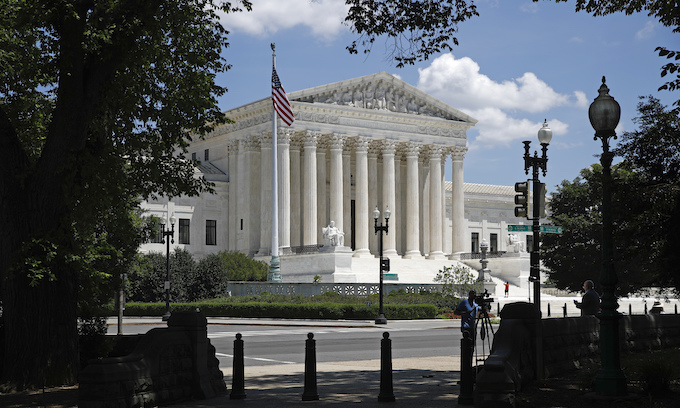The U.S. Supreme Court on Tuesday to hear arguments in a case that challenges the constitutionality of the Affordable Care Act, the landmark healthcare law that’s provided medical coverage to tens of millions of Americans over the past decade.
In the case, California vs. Texas, the high court will seek to determine whether eliminating the mandate — the part of the law that required all uninsured Americans to buy health insurance through ACA exchanges or pay an income tax penalty — renders the healthcare law, known colloquially as Obamacare, unconstitutional.
Related Story: Supreme Court appears wary of striking down Obamacare
Some experts and observers consider the matter the most important case the Supreme Court will decide this term, which began last month and ends at the end of June. Striking down the ACA would cost as many as 20 million Americans their medical coverage and bring a tax cut to the wealthy.
The arguments this morning were streamed and can be heard here.
President Donald Trump has been trying to repeal the ACA since he stepped into office — while President-elect Joe Biden, who helped craft the 2010 law, said during his campaign that he would enhance and expand it. Biden plans to deliver a speech on Tuesday reiterating support for the law.

GOPUSA Editor’s Note: President or Vice-President Elect is an official designation granted when votes have been certified and the result is clear or commonly used after the opposing candidate has conceded. It is not a status conferred by media. Please keep in mind that this is a mainstream media story with the typical lean to the left. We publish the story for the purpose of informing our readers.

The lawsuit was filed by a coalition of 18 Republican-led states headed by Texas Attorney General Ken Paxton, who argue the ACA was rendered unconstitutional by Trump’s 2017 Tax Cuts and Jobs Act, which removed the penalty and declared it illegal.
The part of the ACA that required uninsured people to buy coverage has helped the law stand up to legal scrutiny in the past. The Supreme Court upheld the law’s constitutionality in a 2012 ruling, in which Chief Justice John Roberts said the mandate was within Congress’ taxing authority.
However, the 5th U.S. Circuit Court of Appeals last year upheld a lower court ruling that said the individual mandate was unconstitutional as “it can no longer be read as a tax and there is no other constitutional provision that justifies this exercise of congressional power.”
A group of 20 Democratic states have asked the Supreme Court to overturn the lower court decisions, arguing that the Trump administration’s stripping of the individual mandate had another impact on the case — it made the tax issue entirely moot.
“[The law] may encourage Americans to buy insurance, but it does not require anyone to do anything,” they wrote in their brief. “Individuals still have a choice: Buy insurance or don’t.”
In addition to deciding if the individual mandate is unconstitutional, the court will also have to decide whether the provision invalidates the law as a whole. Republicans and the Texas-led coalition say it does.
The coalition argues that Congress intended for the ACA to work as an integrated whole. The Democrat-led group, however, counters that Congress consciously decided to leave the rest of the landmark law intact three years ago when it agreed to remove the individual mandate.
In previous Supreme Court rulings on the ACA, Justices Clarence Thomas and Samuel Alito Jr. said the law could not be separated or salvaged from the unconstitutional portions. Roberts and Justice Brett Kavanaugh, Trump’s second high court appointee, noted that the high court must closely examine whether the remainder of the law can be severed from the unconstitutional part and remain in place.
“Constitutional litigation is not a game of gotcha against Congress, where litigants can ride a discrete constitutional flaw in a statute to take down the whole, otherwise constitutional statute,” Kavanaugh wrote.
The Supreme Court, which had just eight members for weeks after the death of Justice Ruth Bader Ginsburg, is back to full membership after the ‘controversial’ addition of Amy Coney Barrett last month. She wrote in a law review article three years ago that she considered Roberts’ decision eight years ago that affirmed the ACA “pushed” the law beyond its “plausible meaning” to save the statute.
During confirmation hearings, Barrett answered ACA-related questions from Democrats by saying “presumption is always in favor of severability.”
“When it comes to whether thousands of lawful provisions of the ACA should fall because of one (purportedly) unconstitutional provision, the stakes could not be higher,” wrote legal expert Pratik Shah, who filed an amicus brief on behalf of America’s Health Insurance Plans, a trade association representing health insurance providers, in support of California and the Democratic-led House of Representatives.

GOPUSA Editor’s Note: Please keep in mind that this is a mainstream media story with the typical lean to the left. We publish the story for the purpose of informing our readers.

“At the same time, the answer could not be easier. Scholars and court watchers from all perspectives agree: Whether or not the individual ‘mandate’ is unconstitutional, the rest of the ACA should stand. Even some of the federal government’s most respected career lawyers, including from the solicitor general’s office, appear to have been unwilling to associate themselves with the government’s ultimate failure to defend the ACA.”
Others argue that the mandate was illegal and that, as a result, the law should be illegal.
“If the individual mandate is unconstitutional, then the law can be saved only by severing its unconstitutional provision,” argues expert Andy Schlafly, who filed an amicus brief in support of the Texas-led coalition.
“The Supreme Court should not create severability out of thin air in order to salvage a misguided law.”
The high court will hear Tuesday’s oral arguments by teleconference, and a final decision is expected by next spring.
Copyright 2020 United Press International, Inc. (UPI). Any reproduction, republication, redistribution and/or modification of any UPI content is expressly prohibited without UPI’s prior written consent.
—-
This content is published through a licensing agreement with Acquire Media using its NewsEdge technology.



















Recent Comments